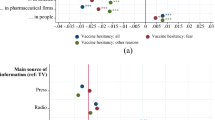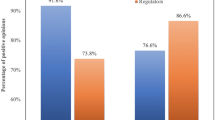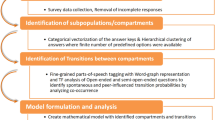Abstract
While scholarly attention to date has focused almost entirely on individual-level drivers of vaccine confidence, we show that macro-level factors play an important role in understanding individual propensity to be confident about vaccination. We analyse data from the 2018 Wellcome Global Monitor survey covering over 120,000 respondents in 126 countries to assess how societal-level trust in science is related to vaccine confidence. In countries with a high aggregate level of trust in science, people are more likely to be confident about vaccination, over and above their individual-level scientific trust. Additionally, we show that societal consensus around trust in science moderates these individual-level and country-level relationships. In countries with a high level of consensus regarding the trustworthiness of science and scientists, the positive correlation between trust in science and vaccine confidence is stronger than it is in comparable countries where the level of social consensus is weaker.
This is a preview of subscription content, access via your institution
Access options
Access Nature and 54 other Nature Portfolio journals
Get Nature+, our best-value online-access subscription
$32.99 / 30 days
cancel any time
Subscribe to this journal
Receive 12 digital issues and online access to articles
$119.00 per year
only $9.92 per issue
Buy this article
- Purchase on SpringerLink
- Instant access to the full article PDF.
USD 39.95
Prices may be subject to local taxes which are calculated during checkout


Similar content being viewed by others
Data availability
The Wellcome Global Monitor dataset (https://doi.org/10.5255/UKDA-SN-8466-2) used in this paper can be downloaded from the UK Data Service website at https://beta.ukdataservice.ac.uk/datacatalogue/studies/study?id=8466.
Code availability
The R code used to fit the models in this paper is available via GitHub at https://github.com/PatrickSturgis/Trust-in-science-social-consensus-and-vaccine-confidence.
References
Ritchie, H. et al. Coronavirus (COVID-19) vaccinations. Our World in Data https://ourworldindata.org/covid-vaccinations (2021).
Heesterbeek, H. COVID-19 will probably become endemic—here’s what that means. The Conversation https://theconversation.com/covid-19-will-probably-become-endemic-heres-what-that-means-146435 (2020).
Randolph, H. E. & Barreiro, L. B. Herd immunity: understanding COVID-19. Immunity 52, 737–741 (2020).
Lazarus, J. V. et al. A global survey of potential acceptance of a COVID-19 vaccine. Nat. Med. https://doi.org/10.1038/s41591-020-1124-9 (2020).
G7 countries perception of COVID-19, Wave 3. Kantar https://www.kantar.com/inspiration/politics/citizen-impact-covid19-infographic (2020).
COVID-19: Global Attitudes Towards a COVID-19 Vaccine (Institute of Global Health Innovation, 2020); https://www.imperial.ac.uk/media/imperial-college/institute-of-global-health-innovation/GlobalVaccineInsights_ICL-Covid-19-Behaviour-Tracker-EMBARGOED-00.01-04.02.2021.pdf
Markel, H. Taking shots: the modern miracle of vaccines. Medscape www.medscape.com/viewarticle/481059 (2004).
Poland, G. A. & Jacobson, T. M. The age-old struggle against the antivaccinationists. N. Engl. J. Med. 364, 97–99 (2011).
Larson, H. J. et al. Measuring trust in vaccination: a systematic review. Hum. Vaccin. Immunother. 14, 1599–1609 (2018).
Goldstein, H. Multilevel Statistical Models (Wiley, 2011).
Gelman, A. Red State, Blue State, Rich State, Poor State: Why Americans Vote the Way They Do (Princeton Univ. Press, 2008).
Fairbrother, M. Trust and public support for environmental protection in diverse national contexts. Sociol. Sci. 3, 359–382 (2016).
Browning, C. R., Dirlam, J. & Boettner, B. From heterogeneity to concentration: Latino immigrant neighborhoods and collective efficacy perceptions in Los Angeles and Chicago. Soc. Forces 95, 779–807 (2016).
Downs, G. W. & Rocke, D. M. Interpreting heteroscedasticity. Am. J. Polit. Sci. 23, 816–828 (1979).
Brunton‐Smith, I., Sturgis, P. & Leckie, G. How collective is collective efficacy? The importance of consensus in judgments about community cohesion and willingness to intervene. Criminology 56, 608–637 (2018).
Reynolds, K. J. Social norms and how they impact behaviour. Nat. Hum. Behav. 3, 14–15 (2019).
Larson, H. J. et al. Understanding vaccine hesitancy around vaccines and vaccination from a global perspective: a systematic review of published literature, 2007–2012. Vaccine 32, 2150–2159 (2014).
Strategic Advisory Group of Experts on Immunization (SAGE) Report of the SAGE Working Group on Vaccine Hesitancy (WHO, 2014); www.who.int/immunization/sage/meetings/2014/october/SAGE_working_group_revised_report_vaccine_hesitancy.pdf?ua=1
Macdonald, N. E. & SAGE Working Group on Vaccine Hesitancy. Vaccine hesitancy: Definition, scope and determinants. Vaccine 33, 4161–4164 (2015).
Larson, H. J. The state of vaccine confidence 2016: global insights through a 67-country survey. EBioMedicine 12, 295–301 (2016).
Larson, H. J., Schulz, W. S., Tucker, J. D. & Smith, D. M. D. Measuring vaccine confidence: introducing a global vaccine confidence index. PLoS Curr. Outbreaks https://doi.org/10.1371/currents.outbreaks.ce0f6177bc97332602a8e3fe7d7f7cc4 (2015).
Cummings, L. The ‘trust’ heuristic: arguments from authority in public health. Health Commun. 29, 1043–1056 (2014).
Barber, B. Trust in science. Minerva 25, 123–134 (1987).
Merk, C. & Pönitzsch, G. The role of affect in attitude formation toward new technologies: the case of stratospheric aerosol injection. Risk Anal. 37/12, 2289–2304 (2017).
Midden, C. J. & Huijts, N. The role of trust in the affective evaluation of novel risks: the case of CO2 storage. Risk Anal. 29/5, 743–751 (2009).
Buskens, V. & Weesie, J. An experiment on the effects of embeddedness in trust situations: buying a used car. Rationality Soc. 12, 227–253 (2000).
Barrera, D. & Buskens, V. Imitation and learning under uncertainty: a vignette experiment. Int. Sociol. 22, 367–396 (2007).
Rothstein, B. Trust, social dilemmas and collective memories. J. Theor. Polit. 12, 477–501 (2000).
Ostrom, E. in Trust and Reciprocity: Interdisciplinary Lessons from Experimental Research (eds Ostrom, E. & Walker, J.) 19–79 (Russell Sage Foundation, 2003).
Wellcome Global Monitor—First Wave Findings (Gallup, 2019); https://wellcome.org/reports/wellcome-global-monitor/2018
Fine, P., Eames, K. & Heymann, D. ‘Herd immunity’: a rough guide. Clin. Infect. Dis. 52, 911–916 (2011).
Gallup World Poll (Gallup, 2018).
Harkness, J. in Cross-Cultural Survey Methods (eds Harkness, J. et al.) 35–56 (Wiley, 2002).
Holmqvist, G. & Natali, L. Exploring the Late Impact of the Great Recession Using Gallup World Poll Data Innocenti Working Paper No. 2014-14 (UNICEF Office of Research, 2014).
Worldwide Methodology and Codebook (Gallup, 2017); https://data-services.hosting.nyu.edu/wp-content/uploads/2017/10/World_Poll_Methodology_102717.pdf
de Figueiredo, A. et al. Mapping global trends in vaccine confidence and investigating barriers to vaccine uptake: a large-scale retrospective temporal modelling study. Lancet 396, 898–908 (2020).
Lord, F. M. Applications of Item Response Theory to Practical Testing Problems (Lawrence Erlbaum Associates, 1980).
Hedeker, D., Mermelstein, R. J. & Demirtas, H. An application of a mixed‐effects location scale model for analysis of ecological momentary assessment (EMA) data. Biometrics 64, 627–634 (2008).
Leckie, G., French, R., Charlton, C. & Browne, W. J. Modeling heterogeneous variance–covariance components in two‐level models. J. Educ. Behav. Stat. 39, 307–332 (2014).
Jackson, J. et al. Police legitimacy and the norm to cooperate: using a mixed effects location-scale model to estimate social norms at a small spatial scale. J. Quant. Criminol. https://doi.org/10.1007/s10940-020-09467-5 (2020).
Huber, B. et al. Fostering public trust in science: the role of social media. Public Underst. Sci. 28, 759–777 (2019).
Angrist, H. A. & Angrist, N. Global Dataset on Education Quality: A Review and Update (2000–2017) Policy Research Working Paper No. WPS 8592 (World Bank Group, 2018).
Buerkner, P.-C. brms: an R package for Bayesian multilevel models using Stan. J. Stat. Softw. 80, 1–28 (2018).
Acknowledgements
The authors received no specific funding for this work.
Author information
Authors and Affiliations
Contributions
All authors made full and substantial contributions. P.S. contributed to conceptualization, writing, reviewing and editing; I.B.-S. contributed to data processing and analysis, writing and editing; and J.J. contributed to conceptualization and writing.
Corresponding author
Ethics declarations
Competing interests
The authors declare no competing interests.
Additional information
Peer review information Nature Human Behaviour thanks Gretchen Chapman, Heidi Larson, Eitan Tzelgov and the other, anonymous, reviewer(s) for their contribution to the peer review of this work.
Publisher’s note Springer Nature remains neutral with regard to jurisdictional claims in published maps and institutional affiliations.
Supplementary information
Rights and permissions
About this article
Cite this article
Sturgis, P., Brunton-Smith, I. & Jackson, J. Trust in science, social consensus and vaccine confidence. Nat Hum Behav 5, 1528–1534 (2021). https://doi.org/10.1038/s41562-021-01115-7
Received:
Accepted:
Published:
Version of record:
Issue date:
DOI: https://doi.org/10.1038/s41562-021-01115-7
This article is cited by
-
Trust in science, knowledge and risk perception as predictors of COVID-19 vaccination: application of an extended Theory of Planned Behavior model in Hungary
BMC Public Health (2026)
-
What are parents' preferences for Human Papillomavirus vaccination promotion messages and communication? Application of a discrete choice experiment to a French Caribbean setting
BMC Public Health (2025)
-
On different roles of interpersonal and institutional trust and trust in scientists in shaping COVID-19 vaccine hesitancy
Discover Public Health (2025)
-
No evidence for causal effects of trust in science on intentions for health-related behavior
Communications Psychology (2025)
-
Association of COVID-19 outcomes with measures of institutional and interpersonal trust: an ecological analysis using national data from 61 countries
Scientific Reports (2025)



